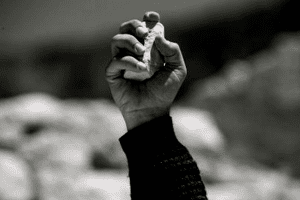Remember that Bible story: “Jesus Scatters Self-Righteous Men in the Name of Mercy and Justice!” No? Mmm… How about this one: “The Woman Caught in Adultery.” Yeah, that’s more familiar. It’s the same story, but a completely different interpretation.
Jesus’ point in this story is that these religious men have leveraged their considerable power and influence to manipulate this woman (without power or influence) as a pawn in their politics. The interpretation handed down to us (by religious men who have leveraged their considerable power and influence) calls out the woman on the margins (without power or influence), as if Jesus wants her to pull it together already and stop sinning. Please! No more sin! This interpretation completely misses the main point: which is that these men in authority have manipulated and exploited and abused this woman on the margins.
Jesus is not calling out the woman—he’s calling out the religious leaders! Jesus instantly knows the hearts of everyone involved—I love that! He doesn’t fall for their tricks—I love that! And he lets the woman go—I LOVE that!
It’s a stunning story that turns the power structure on its feet. We should not be surprised that the power structure has turned it back into the way that supports them. Today’s standard version handed down by male Christian leaders reads it as, “Go and sin no more.” What a lie. This is a bone-chilling story that condemns religious leaders in power. To land on that last bit, that’s been translated as, “Go and sin no more,” or even the softer, “Go and leave your life of sin,” cuts the very heart out of the story. It manipulates, exploits, and abuses this story just as the religious leaders did to that woman on the margins, just as religious leaders have done ever since to women and others on the margins.
But Jesus always fights for those on the margins and condemns religious leaders who exploit and abuse them. Jesus always defends people on the margins, which he called compassionately called, “the least of these,” meaning they have the least power, the least visibility, the least options.
Jesus was not telling her to do better, to “pull herself up by her own bootstraps” (a physical impossibility). He was inviting her to life, that he would show her. His message to this woman is: “You don’t have to live this way. I’m here to offer you so much more than anything you’ve ever known.” That’s the heart of the story.
First, look at the setting: this woman had just been caught in adultery—by the men who set it up to entrap Jesus (a big clue is that they didn’t bring out the man also participating in adultery, because he was part of it). This is not the first time religious leaders put their heads together to concoct a plan to bring him down.
These men drag this woman out to the public square as an adulteress. Before Jesus. Before the crowd. Naked. Can you imagine the shame? I shudder to think. And the fear. She knew that the consequence was immediate death by stoning.
Jesus knew it too. Of course he’s obviously stuck, obviously backed into a corner by these clever men who have finally succeeded in entrapping him—Jesus has absolutely no way out, no way. Until he opens his mouth.
Then Jesus says something remarkable, as he always does, from way outside the box. He says, “You who are without sin cast the first stone.” Now, let’s not let the fact that we’ve heard that before make it old news to us—this is a remarkable thing to say.
The crowd is stunned. Flummoxed. They’ve never heard a response like this—this is now how these situations are dealt with… ever. It takes a minute. Then slowly the older men and then the younger ones drop their stones and turn away (most likely in guilt, as their own ploy to entrap this woman rings in their ears, plus who-knows-what other shenanigans they’ve pulled that week, whatever other skeletons they had hidden away). Only Jesus could have given such a mindboggling response. When I say how much I admire Jesus, it is largely because of this ability he has to puncture the air around him. Time and again, he circumvents their yes-or-no questions and gives an answer that was not even possible until that moment.
Then he turns to the woman. “Does no one condemn you?” “No one, Sir.” “Neither do I condemn you.” What?? You don’t? Why not? You have every right to condemn me under the law. Isn’t that what you do? Apparently not. But why not? This is important.
Religious tradition claims that the main point of this story is, “Go and sin no more,” like a mandate to rid her life of sin, an implied condition of her release. Like the policeman who lets you off with a warning might say, “Now, keep your speed down.” The implication is, “I’m going to let you off this time, but don’t push your luck—and get out of here before I change my mind.” That’s usually the feel of, “Go and sin no more.”
But that’s not what Jesus is saying. For one thing, nobody goes and sins no more. Do they? Doesn’t everyone deal with the need to course-correct—to a some degree or other—their whole lives? Yes.
But he’s also not saying, “Now, don’t do that again,” which is what it’s usually how it’s interpreted. Because listen, this woman has had a good long walk to think things over. Walking, naked, to her execution, she had plenty of time to think, that if by some miracle she did not die on the spot from embarrassment, or from stoning, she would never, ever, no never, get caught in this situation, ever, again. The trouble is not voluntarily choosing to be in that situation again; the question is, how? How do I constantly find myself on the raw end of this deal? Why do I keep letting men like this take advantage of me? Why does this happen over and over again? How in the world do I find a way out from my broken and wounded heart? Anybody so shamed and humiliated would be searching for a way out, vowing never to let this happen again. That was the question Jesus answered! As always, he answered her real need! He’s saying, “You don’t have to live this way.” That’s astounding news for this woman! I don’t? she had to ask herself. No, Jesus was telling her, you don’t.
Remember that this whole passage was not in the original of scripture. You’ll see a note in your bible that says it was added in some 400 years after Christ. This doesn’t mean Jesus didn’t say it—it sounds exactly like something he would say, and would likely have come down through the oral tradition until it was finally written down. But that time lapse means it won’t be the exact same words as if you’d been sitting there. In addition, it was interpreted and translated over those many years. So rather than applying a modern headspace to modern words we see on the page, we need to look at the context, of the story and the culture, to understand.
Jesus’ MO is to deep healing for the least powerful, the least recognized, the ones most easily abused by people in power—which is exactly what happens. I mean, he just overthrew the law! He just gave her a free pass—on adultery! Yes, he did. That’s what readers find troubling. He just sided with this woman over the religious leaders—men who didn’t care if they destroyed her, just as many religious leaders today don’t care if they destroy those who can’t defend themselves. He gave her an earth-shattering offer of life—you think he’d now reduce that to a silly throwaway line that simply reinforces the Pharisee’s lifeless rules? The very thing he’s been criticizing in them? No. He just ran them all off—he’s not now going to pull from their playbook.
Jesus had compassion for the tenderhearted. He never shamed or humiliated the down-and-outers but always gave them hope. Come to me and I will give you LIFE. (Not rules, which produce death.) He lifts our head and heals our broken hearts.
Next time someone throws the interpretation at you, as evidence that you are not taking sin seriously enough because you’re not judging and “correcting” everyone, take a breath and remember that you are in good company: they said the same things to Jesus.
Inclusive community and extensive resources. Come say hello.














